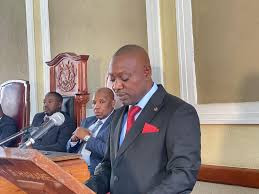
A PROPOSED US$750 million smart water meter project has sparked fierce debate among Harare councillors, who are demanding clarity on how the massive cost will be funded and its impact on residents.
The controversy emerged during the presentation of the city’s 2026 budget last week, which outlined a plan to roll out prepaid smart water meters across all residential and commercial properties through a public-private partnership.
Finance committee chairperson, councillor Costa Mande presented the initiative as part of a broader 2026-30 WASH [water, sanitation and hygiene] modernisation strategy.
He stated that the project aligned with Vision 2030 and aims to promote financial sustainability, transparency and improved customer service.
“Consequently, water consumption will be charged on a pay-as-you-use basis, allowing households to monitor usage in real time and avoid estimates,” Mande said.
“This model ensures predictable revenue streams for the city while promoting equity, conservation and transparency.”
However, the explanation did little to appease concerned councillors.
Councillor Denford Ngadziore argued that the budget failed to clearly explain how the US$750 million cost will be covered and whether the burden will fall directly on residents.
- Harare unveils $213bn budget
- Harare cllrs blow US$20K in 4 days
- HCC unveils US$500m budget
- Harare official fired to facilitate recruitment
Keep Reading
“In the spirit of public accountability, I believe the budget should have very clearly stated how the residents will be able to pay US$750 million for smart water meters,” Ngadziore said.
“How is it clear in the budget? That’s what I want the players to answer.”
Ngadziore further demanded that the entire smart meter initiative “be cancelled by the government”, citing a lack of transparency.
He also complained about the current billing system, saying residents are being charged for water they do not use.
“The water is not being used. The cost is on the total bill,” Ngadziore argued, questioning the purpose of recent committee meetings where councillors had voiced reservations about tariff increases.
Local Government minister Daniel Garwe recently said President Emmerson Mnangagwa would soon launch the privatisation of Harare’s water supply.
Garwe described the development as a crucial step towards restoring order and efficiency in urban service delivery.
He also revealed that the government has signed a memorandum of understanding with private players for collaboration in the waste management sector.
Mayor Jacob Mafume later announced that the city’s smart water meter project is underway, with installation expected to be completed by year-end despite fierce opposition from ratepayers.
In a statement, the Community Advocacy for Local Inclusion and Sustainable Opportunities (Comaliso) said water privatisation was not a solution to accessing clean and affordable water.
“As Comaliso, we agreed with our colleagues at Combined Harare Residents Association, Harare Residents Trust and all residents’ associations in Mutare, Gweru and Bulawayo that water is not only life, but also a human right,” Comaliso said.
Other watchdogs have accused the City of Harare of sidelining residents and kowtowing to central government directives that benefit “handpicked tenderpreneurs”.
The push to privatise waste management, water supply in Harare comes amid long-standing issues of council under-investment and corruption.
The government is pushing to replicate the privatisation model in other cities across the country.
Critics have, however, said the government in collusion with the City of Harare is setting a precedent that prioritises political compliance over public service and procedural integrity.










